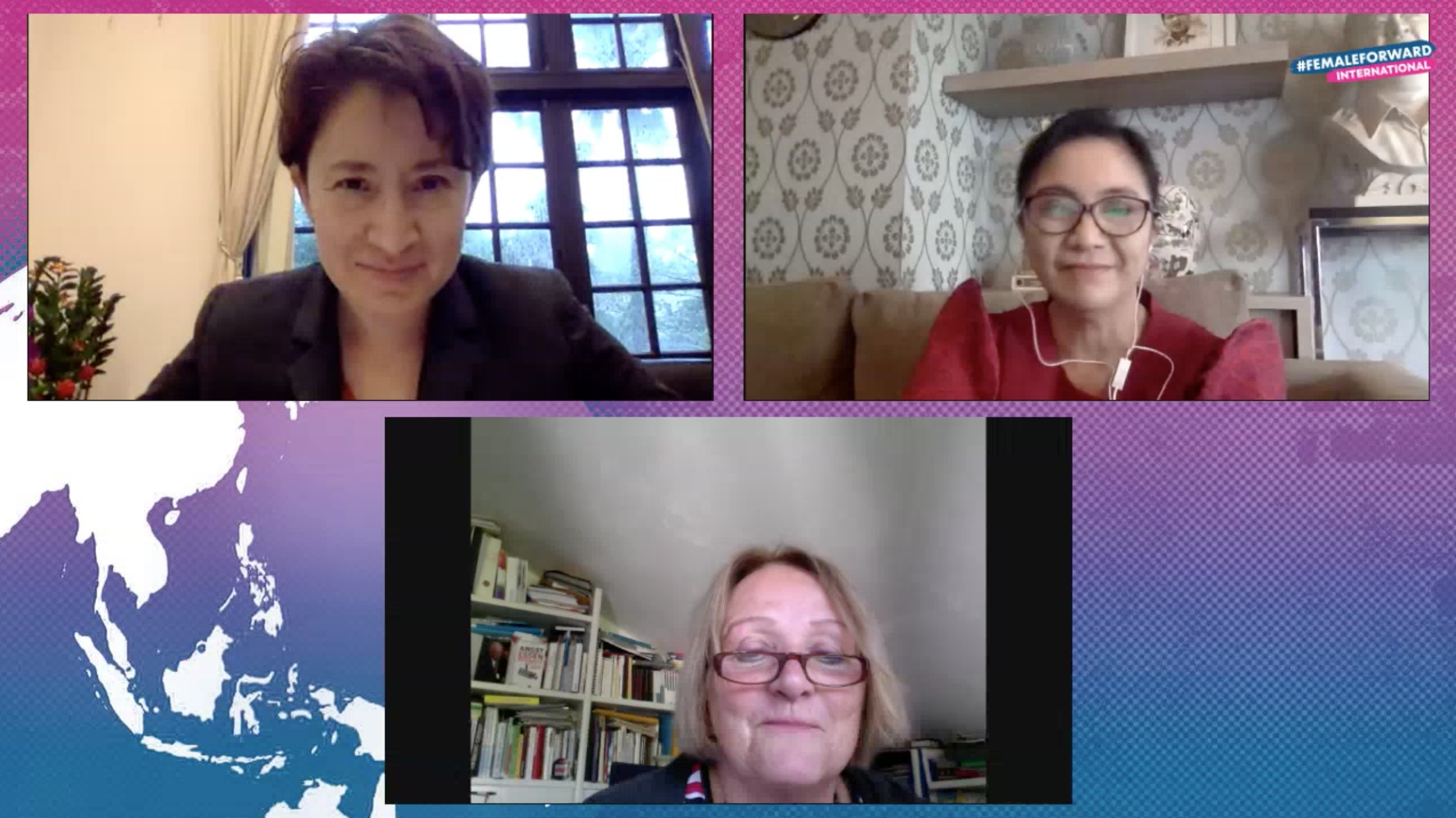Empowering Women Means Helping the World

Philippine Vice President Leni Robredo (upper right), CALD Chair Bi-Khim Hsiao (upper left), and FNF Deputy Chair Sabine Leutheusser-Schnarrenberger (bottom center)
The world is definitely changed. Economies have ground almost to a halt. The traditional boundary between home life and work life has collapsed, and the way we communicate is now filtered through technology and other media. Many of us here have probably spent the past months asking the big questions: what will jobs look like? What will our schools look like? How do families, friends, and neighbors celebrate with one another moving forward? How does this pandemic magnify the persistent problem of inequality, particularly the inequality experienced by women? And how do we respond?
Here in the Philippines, the difficulties brought about by poverty and marginalization have only heightened under the pandemic. Those who used to survive on subsistence wages have had to rely on government-provided aid to get by. Those who lacked access to basic services pre-COVID feel the effects of the pandemic closer to their guts. We know that, during times of crises and national emergencies, cases of domestic and family violence increase, because victims are trapped with their abusers in a single space. Worse, many cases go unreported so victims cannot call out for help.
There are even more troubling reports indicating that, under the Enhanced Community Quarantine (ECQ) or ‘lockdown’ as we call it, the rules that were meant to protect us have been prone to abuse. One such report narrates a woman being forced into sex by abusive police officers just so she can cross a border between cities to get a kilo of rice. Some of our nurses who serve at the front line against the disease have been forced to walk 10 kilometers to and from work because basic transportation remains shut down, and alternatives remain absent in far-flung places. The delivery of reproductive health services to women is another challenge we face. Even before the COVID-19 outbreak, the Philippines grappled with the highest rate of teenage pregnancy in the ASEAN region, with almost 14% of Filipinas below 18 years old getting pregnant in 2018. Continuing reproductive health programs will play a pivotal role in ensuring that the lives of young girls in the poorest regions are not burdened with the weight of raising a child when the mother herself should still have her own future ahead of her. Amid all of these challenges, we must find our feet, and push forward.
We cannot allow what we face to crush our spirit. As we have always done throughout our struggle for equality, we have made much out of little, and more than made do when we were given less. In our own efforts to respond to COVID-19, my office—the Office of the Vice President—has had to face a similar struggle. Our mantra, as always: Find the gaps and fill them. Find a way.
Two days after the shutdown of public transportation was declared, we began providing free shuttle services to medical workers, in the end managing a total of eight different routes. The service lasted a month. And it wasn’t easy. Every day was a learning experience, but what we took away from this was that an effective, organized means of mass transport was possible in the Philippines. And we didn’t do this alone. Working with the private sector was crucial. Volunteers from everywhere formed the cornerstone of our success, and constant daily feedback paved the way for improvement. And, like many women who take care of domestic work in their own homes, our work remains unfinished. Protective equipment sets still need to be distributed; public transport remains shut down, so we continue to find—to provide free dormitories for front liners. We’re also expanding an app-based online community market to help out small vendors who were hard hit by the lockdown, while ensuring that those who need access to food and other basic needs don’t need to risk going out of their homes.
Today, as we listen to our speakers, we will hear their stories—stories of women providing leadership where it is absent, hope to those who have given in to despair, and a plan in a time where a clear view of the horizon is as important to the human spirit as food is for our bodies. I hope that the things we share here reach all the worlds we inhabit—our homes, our workplaces, and larger communities.
I am confident that what we’ll talk about today will affirm our shared belief: The strongest societies are the most inclusive societies. These are places where the full measure of talent and experience from every sector contributes to solving our greatest problems. COVID-19 is the greatest challenge we have faced, perhaps in the entirety of modern history. And as we have always done, we will rise to meet this challenge and eventually overcome.
Delivered on the webinar COVID-19: An Opportunity to Advance Women’s Rights and Gender Equality co-organized by the Friedrich Naumann Foundation for Freedom and the Council of Asian Liberals and Democrats on 29 May 2020